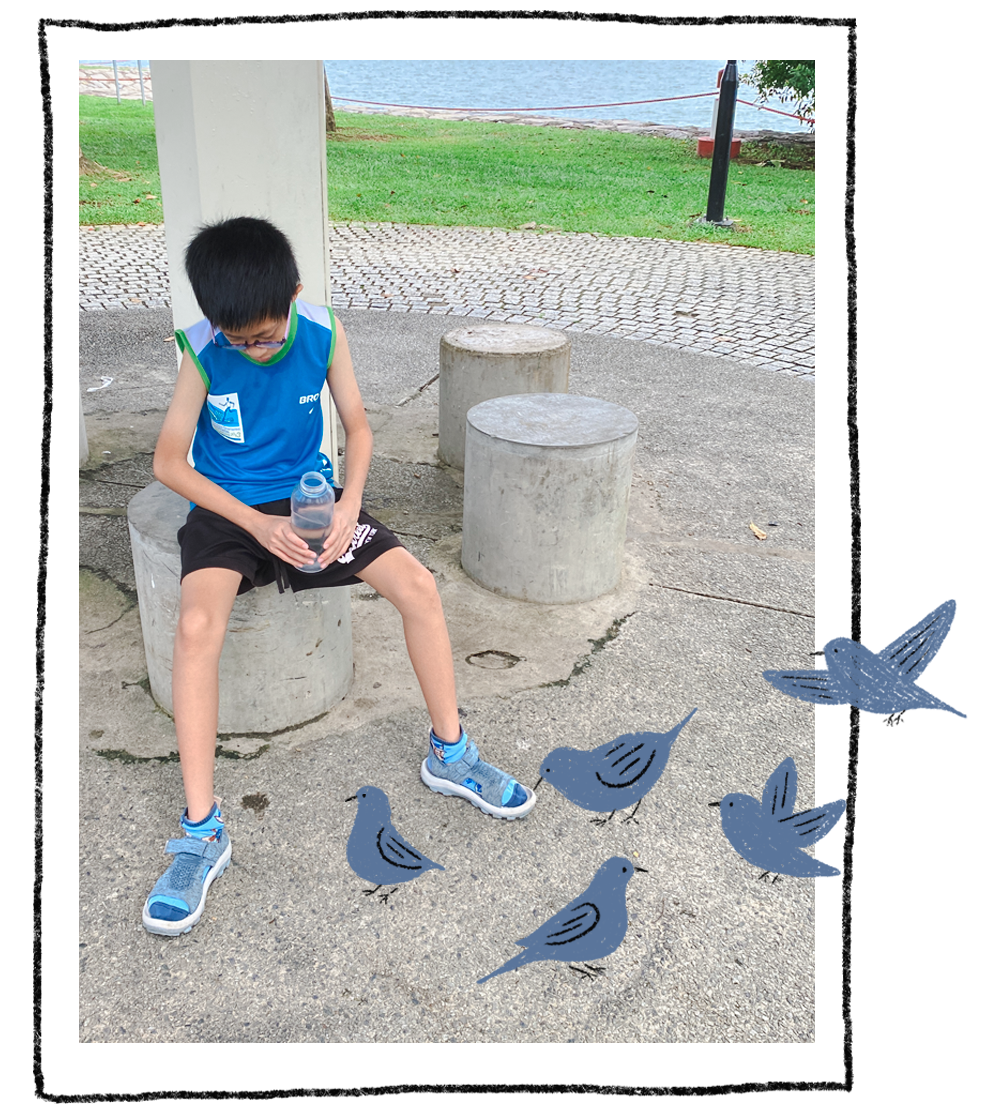
When Caleb, my youngest of two boys, turned two years old, we noticed he liked to spin objects like lids, toy plates, and even laundry baskets.
We thought it was all in good fun, and a passing phase.
We didn’t realise then that spinning objects was one of several early signs for autism.
Looking back, we had suspected that Caleb was “different” ever since he was born—we just didn’t have a name for it.

As a baby, he slept poorly, drank milk with great difficulty, ate little, and cried a lot due to acid reflux. He also had frequent breath-holding spells, each lasting a few agonising seconds (which to us felt like minutes!). These spells often caused his face to turn blue—a parent’s worst nightmare!
It was a difficult first year for my wife and me, to say the least.
Our Daily Bread for Kids Bible Activity Book Vol. 2: The Life of Christ
Introduce your children to the person and works of Jesus through this fun-filled resource!
Get a copy
Every month, we roll out a new resource for parents and children. To find out about these offers, why not subscribe to our email updates? Stay informed about the latest resources available, and be the first to get a copy!
Grappling with a Diagnosis
Over the next couple of years, we observed that Caleb lagged behind his peers in gross and fine motor skills, as well as social skills. Compared to his older brother, Caleb also took longer to learn how to walk and talk.
Suspecting he might have Global Development Delay (GDD), his childcare teachers advised us to send him for an early intervention programme in hopes he would catch up with his peers. His progress, however, remained slow, and we began to suspect he might have something more than just GDD.
At many moments, we felt helpless and concerned. What would this mean for his development? Would he be able to cope when he starts primary school? Can his special needs be “fixed”?
By the time Caleb turned six, we knew he wasn’t ready for mainstream primary school. So, we applied for a deferment—which required an official diagnosis.
This was a big step for us. We worried what a diagnosis would mean for our son. Having a “label” might change his identity and lock up his future. We wondered, too, what it would mean for us as a family.
At the same time, we wanted to know, once and for all: Was Caleb on the autism spectrum?
One month before he was supposed to start Primary 1, his diagnosis was confirmed: our son had moderate autism.
We struggled to come to terms with his diagnosis. We felt disappointment, guilt, anguish, despair, anger, denial, and fear . . . in what seemed like an endless cycle.
We felt great relief at having a name for his condition—at last! We would finally get the appropriate support, and take the right steps to help him manage the condition.
But our sense of relief was quickly replaced with other overwhelming emotions. We struggled to come to terms with his diagnosis. We felt disappointment, guilt, anguish, despair, anger, denial, and fear . . . in what seemed like an endless cycle.
We wondered: Can we “fix” his autism? Would he—and we—ever have a normal life? What will happen to him when we pass on?
The questions were endless, from pragmatic to existential.
My Son—A Blessing?
Caleb is now 13 years old. While I love him dearly and relish our time together, there are days it’s hard for me to feel thankful for having this child. This is especially so on days when it takes every ounce of energy I have just to maintain my composure and patience.

From daily routine instructions I repeat ad nauseum (“Son, finish your food, tidy the toys, wash your hands—with soap”), to helping him cope during National Day fireworks or a neighbour’s noisy renovations (“Son, it’s alright, the loud fireworks will be over soon. Don’t press your earmuffs so tight over your ears”), the challenges of caring for him can feel like an emotional see-saw.
Once, someone in a messaging chat group shared a text written by a fellow stay-at-home dad: “Some of us have children with higher support needs; some of us don’t. Some of us have children literally abusing us daily, killing us mentally and physically; some of us don’t. Some of us have to grapple with heavy burdens, be it financial, medical, or otherwise; some of us don’t. So, to the many who tell me that children are a blessing, please do tell me—how is this the case?”
It’s a question that I, too, wish someone would give me an answer for.
Though I’ll never trade my son for another, it’s certainly no walk in the park being his caregiver. So, when I read this father’s raw message written in such pain, I could easily commiserate with him.
When Caregiving Overwhelms
Every caregiving journey is different. No two special needs persons are exactly alike in their condition and challenges, so no two caregivers will have the same experience either. Some parents do indeed have it tougher than others.
Yet, at the same time, living with someone who needs constant care for his day-to-day needs is something I’m very familiar with, and I know firsthand what it can do to the caregiver’s mental and psychological well-being.
I know what it’s like to feel overwhelmed, especially on days when anything that can go wrong goes wrong. It could be a meltdown triggered by something unexpected, or a routine gone awry.
On those days, I find myself turning to the Lord in desperate prayer to bring peace and stability into my life. Over the years, God has been kind to share my struggles. He shows through His Word and various life situations that He both understands and cares for me as a dad with a special needs kid.
God, who is in control, loves and cares for me—but I need to cease striving if I’m to experience it and be restored by Him.
The two Bible verses I always cling to are:
Be still, and know that I am God.
—Psalm 46:10
Love the LORD your God with all your heart and with all your soul and with all your strength.
—Deuteronomy 6:5
They remind me of two insurmountable truths: God, who is in control, loves and cares for me—but I need to cease striving if I’m to experience it and be restored by Him. I must love God wholeheartedly with every fibre of my being, and be fully assured that He is in every difficult parenting moment I have with my son.
I have begun to see that parenting is not so much about moulding a child. Instead, parenting is God’s single greatest portal to moulding me to be a man after His own heart to fulfil His purpose for my life and my family.
What Fellow Parents Can Do
While there is now more awareness of those with special needs, more can still be done to build greater acceptance. And who better to lead the way than the church?
If you’re a parent, may I invite you to get to know us caregivers? Perhaps, take the initiative to talk with us when you see us at Sunday service. You could get to know us, our children, and our family’s challenges. You could even ask how you can support us, or what to do to help us feel seen and accepted. As you do this, you’re modeling for your children what it looks like to include and relate to someone who behaves differently due to special needs.
To take it a step further, you could also invite us to your home or parties, read up on special needs, or check out resources from disability mission organisations on how churches can better support their special needs members.
You’re modeling for your children what it looks like to include and relate to someone who behaves differently due to special needs.
The journey of relating to fellow parents of children with special needs may not be easy or comfortable. But I’m filled with hope when I read Psalm 127:3: “Children are a heritage from the Lord, offspring a reward from him.” Jesus loves us all and, when He was on earth, exemplified what it means to welcome little children (Matthew 18:5). Nowhere in the Bible does God exclude children with special needs. And, I believe, neither should we.
Fellow parents, as we learn to include and embrace the special needs community in our churches, I pray that our understanding of and love for our Lord will grow and overflow to the special needs children in our midst, their caregivers, and eventually, the rest of the world.





